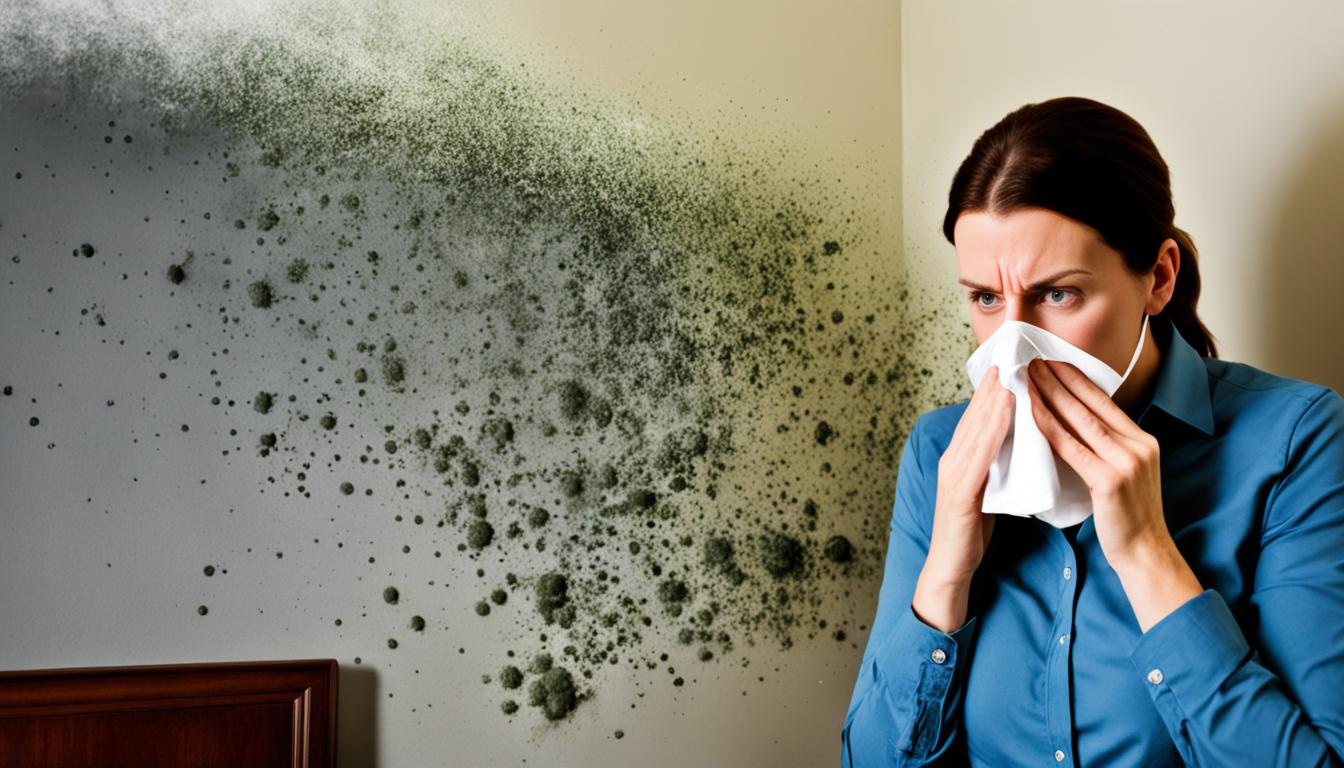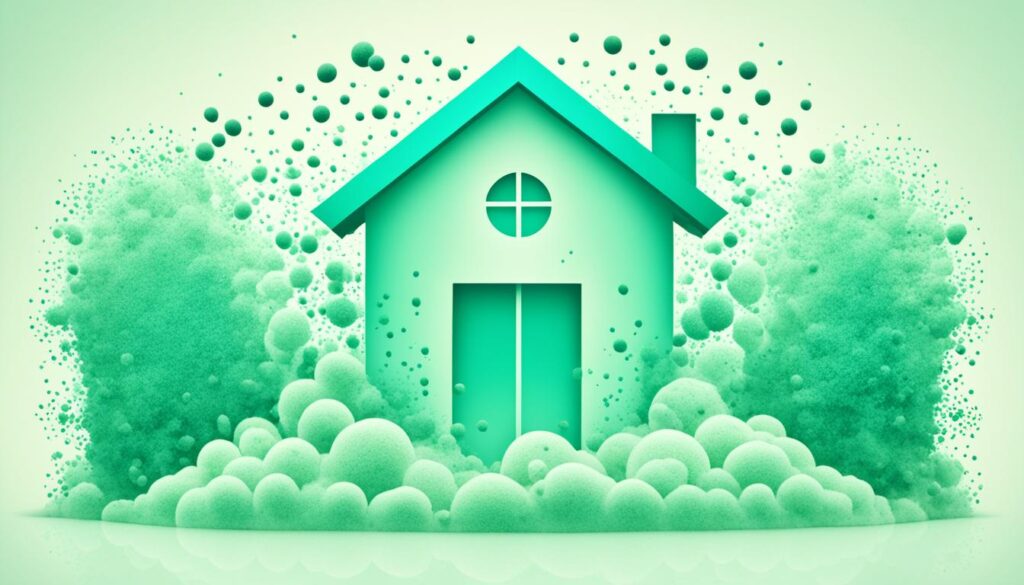
Mold Toxicity Risks and Health Impact Guide
Welcome to our comprehensive guide on mold toxicity. In this article, we will explore the health dangers associated with mold exposure and provide valuable insights into the impact it can have on your well-being. Whether you are a homeowner, renter, or concerned individual, understanding the risks and taking necessary precautions is essential to safeguard your health.
Mold toxicity occurs when individuals are exposed to high levels of mold spores, leading to a range of health issues. Breathing in mold spores can irritate the respiratory system and trigger allergic reactions. Prolonged exposure to mold can also result in more severe health conditions.
Our guide aims to equip you with the knowledge needed to recognize the symptoms of mold toxicity, prevent its growth, and take appropriate measures if you suspect mold in your environment. By implementing the strategies outlined in this guide, you can protect yourself and your loved ones from the harmful effects of mold exposure.
Key Takeaways
- Understanding the risks associated with mold toxicity is crucial for protecting your health.
- Mold exposure can lead to respiratory issues and trigger allergic reactions.
- Recognizing the symptoms of mold toxicity is vital for early detection and treatment.
- Implementing effective prevention and control measures can minimize the risk of mold growth.
- Seeking professional help for mold assessments and remediation is essential for thorough and efficient resolution.
Understanding Mold Toxicity
Mold toxicity is a serious health concern that can have significant impacts on our well-being. In this section, we will delve into the various aspects of mold toxicity, including its symptoms and the potential health effects it can cause. Understanding these aspects is crucial for identifying and addressing mold-related issues.
Common Symptoms of Mold Toxicity
Mold exposure can lead to a range of symptoms that may vary from person to person. Some common signs of mold exposure include:
- Respiratory issues such as coughing, wheezing, and shortness of breath
- Allergic reactions like sneezing, watery eyes, and nasal congestion
- Skin irritation, rashes, and hives
- Headaches and migraines
- Fatigue and difficulty concentrating
- Gastrointestinal problems
It is important to note that these symptoms may resemble other health conditions, making it essential to consult a healthcare professional for an accurate diagnosis.
Potential Health Effects of Mold Toxicity
Exposure to mold can have detrimental effects on various bodily systems. The health effects of mold toxicity may include:
- Respiratory System: Prolonged exposure to mold spores can worsen existing respiratory conditions, such as asthma and chronic obstructive pulmonary disease (COPD). It can also lead to the development of respiratory infections and inflammation.
- Immune System: Mold toxins can weaken the immune system, making individuals more susceptible to infections and illnesses.
- Nervous System: Certain types of mold produce mycotoxins that can affect the nervous system, leading to neurological symptoms like memory problems, mood swings, and difficulty with coordination.
- Allergies and Sensitivities: Mold exposure can trigger allergic reactions in some individuals, causing symptoms such as sneezing, itching, and skin irritation.
- Other Health Conditions: Some studies have suggested a possible link between mold exposure and conditions like chronic fatigue syndrome, fibromyalgia, and autoimmune disorders. However, more research is needed to establish definitive connections.
It is important to address mold issues promptly to reduce the risk of developing long-term health complications. Seeking professional assistance for proper mold remediation is crucial for ensuring a safe and healthy environment.

Long-Term Consequences of Mold Toxicity
Long-term exposure to mold toxicity can have severe consequences on overall health and well-being. The prolonged presence of mold toxins in indoor environments can lead to chronic health issues and worsen existing conditions. The severity of these consequences may vary depending on factors like the duration of exposure, individual susceptibility, and the type of mold present.
By understanding the symptoms, health effects, and long-term consequences of mold toxicity, we can take necessary precautions to protect ourselves and our loved ones. In the next section, we will discuss prevention and control measures to minimize the risk of mold growth and ensure a healthy living environment.
Prevention and Control Measures
To protect yourself from mold growth and the potential risks of mold toxicity, it’s crucial to implement proactive measures and establish a mold-free environment. By following these practical tips, you can minimize the chances of mold infestation and safeguard your well-being.
Effective Cleaning Methods
Cleaning and maintaining a clean living or working space is essential for mold prevention. Regularly dust and vacuum your surroundings to remove any accumulated moisture, dirt, or debris that may contribute to mold growth. Pay extra attention to areas prone to dampness, such as bathrooms, kitchens, and basements. Use mold-preventing cleaners to eliminate any existing mold and inhibit its regrowth.
Proper Ventilation Strategies
Proper ventilation plays a significant role in preventing mold growth. Ensure that your home or workplace has adequate ventilation systems, such as exhaust fans and air circulation devices. These systems help minimize humidity levels and promote airflow, reducing the favorable conditions for mold to thrive. Additionally, keep windows open, especially during humid or rainy periods, to allow fresh air to enter and prevent moisture buildup.
Regular Inspections and Professional Assessments
Timely detection and addressing of mold issues are crucial in preventing their escalation. Conduct regular inspections of your property to identify any signs of moisture or mold growth. Pay attention to areas prone to water leaks, such as plumbing fixtures, roofs, and windows. If you notice any suspicious spots or a musty odor, it’s advisable to seek professional mold assessments. Certified mold remediation experts can identify the extent of the mold problem and recommend appropriate remediation techniques to eliminate it.
“Prevention is always better than cure. Take proactive steps to prevent mold growth and protect your health from the dangers of mold toxicity.”
Mold Prevention Checklist
| Prevention Measures | Description |
|---|---|
| Control Moisture | Fix any leaks or water-related issues promptly. Use dehumidifiers in humid areas. |
| Ensure Proper Ventilation | Install exhaust fans and increase airflow to reduce humidity levels. |
| Keep Indoor Spaces Dry | Wipe up spills and condensation promptly. Use air conditioners and fans in humid rooms. |
| Use Mold-Resistant Materials | Select building materials, paints, and furniture that have mold-resistant properties. |
| Regular Maintenance | Inspect and clean surfaces prone to mold growth regularly. |
| Promote Air Circulation | Keep furniture away from walls and ensure unobstructed airflow in rooms. |
By following these prevention measures and being proactive in addressing mold-related concerns, you can protect yourself and your loved ones from the potential health risks associated with mold toxicity.

Conclusion
In conclusion, mold toxicity poses significant risks to our health and well-being. As we have discussed in this comprehensive guide, exposure to mold can lead to various health issues, including respiratory problems, allergies, and even neurological symptoms. It is crucial to be aware of these dangers and take necessary precautions to protect ourselves and our loved ones.
Prevention is key when it comes to mold growth. By implementing effective measures such as maintaining proper ventilation, controlling humidity levels, and promptly addressing any water leaks or moisture issues, we can minimize the risk of mold infestation in our homes and workplaces. Regular inspections and professional mold assessments can also help to detect and address mold problems before they become severe.
If you suspect mold in your surroundings, it is essential to seek professional help for a thorough assessment and remediation. Fix Mold Miami is a trusted provider of mold assessment services in Florida. Contact Fix Mold Miami at 305-465-6653 for a reliable and comprehensive mold inspection.




